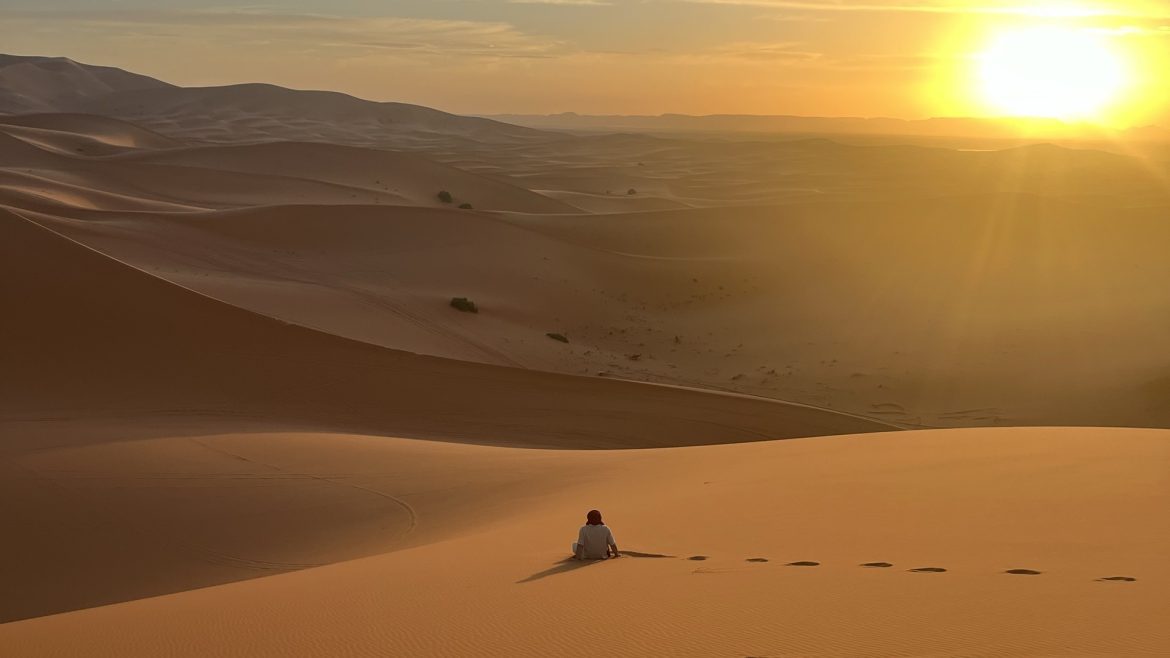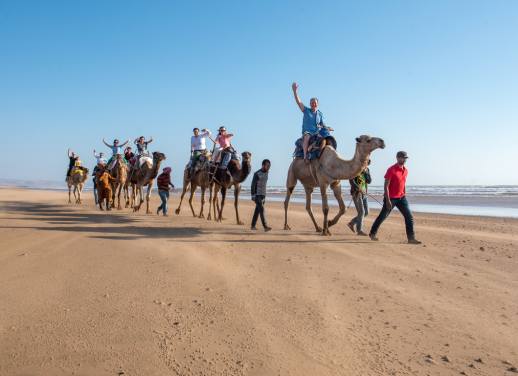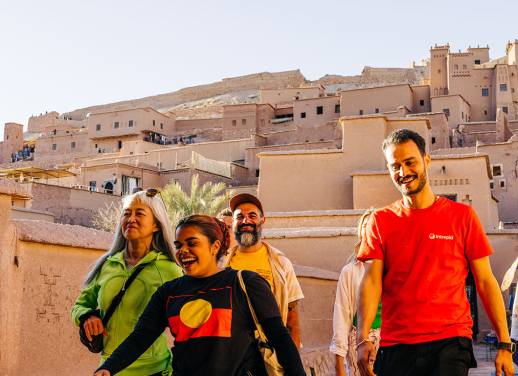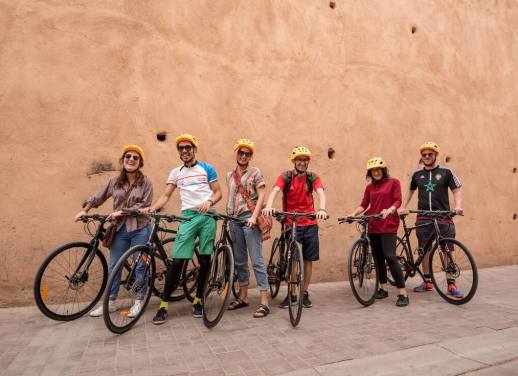On a trip to Morocco, Chalice learns the power of personal ritual and purposeful reflection. As she processes her own grief, she connects with other travellers who have their own ways to honour those they’ve lost.
A loud sigh came from the seat in front of us.
‘Does anybody know origami?’ John asked.
John and his wife Julianne were fellow travellers on my small group trip to Morocco. I had come with my partner and my best friend. Dan, Zoe and I took up the back row of the minibus like naughty school kids. John often sat in front of us – maybe because we were the only ones who laughed at his dad jokes, or perhaps because he was a naughty kid, too.
‘Oh yeah, I used to make paper cranes all the time!’ Taia, a Gen Z on her first solo trip abroad, volunteered. She seemed to have about a million talents; among hiking, diving, baking and taking the perfect iPhone photo (I recommend you befriend the youngest on your trip if you want a good Instagram), this was just another welcome challenge.
‘Do you think you could make one in time for the Sahara?’ asked John. Exasperated yet hopeful, he held up his phone to show her the Googled template of a crane. ‘Usually, my sister gives me one because I’m useless at making them, but I’ve left it at home!’
Seeing as we were about an hour away from the desert dunes, this mission suddenly felt serious.






Clockwise from top left: Cranes in Zimbabwe, South Africa, Brazil, Portugal, Bolivia and Cook Islands.
Paper cranes for Kari-Lee
Through my travels, I’ve found it’s often the people with the brightest spirits that have the most heartbreaking stories. That afternoon, as we drove through flat desert landscapes on the way to what we all expected would be our trip highlight, John told us about his niece, Kari-Lee.
Known for her adventurous spirit and positive attitude, she refused to let her cystic fibrosis hold her back from exploring the world. After leaving high school, she travelled to an impressive 38 countries, including Tahiti, which ticked all her summer-girl boxes; Italy, where she lived and studied for eight months in Urbino; and Brazil, where she danced at Carnival.
When Kari was waiting for her double lung transplant at The Prince Charles Hospital in Brisbane, Australia, her cousin Cass was living in Japan. Inspired by Eleanor Coerr’s novel Sadako and the Thousand Paper Cranes, Cass began folding 1000 paper cranes, sending them to Kari in Australia as a token of hope. Kari’s mum, Rhyl, strung the cranes above her hospital bed, using this ritual to remind Kari that she was loved, more than 1000 times over.
At the too-young age of 27, Kari-Lee was forced to leave her adventures unfinished when her transplant failed. The cranes were watching over her as she left this world. At her funeral, the family passed them around to the 1000 guests, hoping that a few might make it to the places Kari never got to see.
John continued telling us about his niece as we sat in our desert tent with little cups of fresh mint tea, and our small group of travellers all became a little closer.
‘Now, everywhere Julianne and I go, we take a paper crane… for Kari,’ he said.
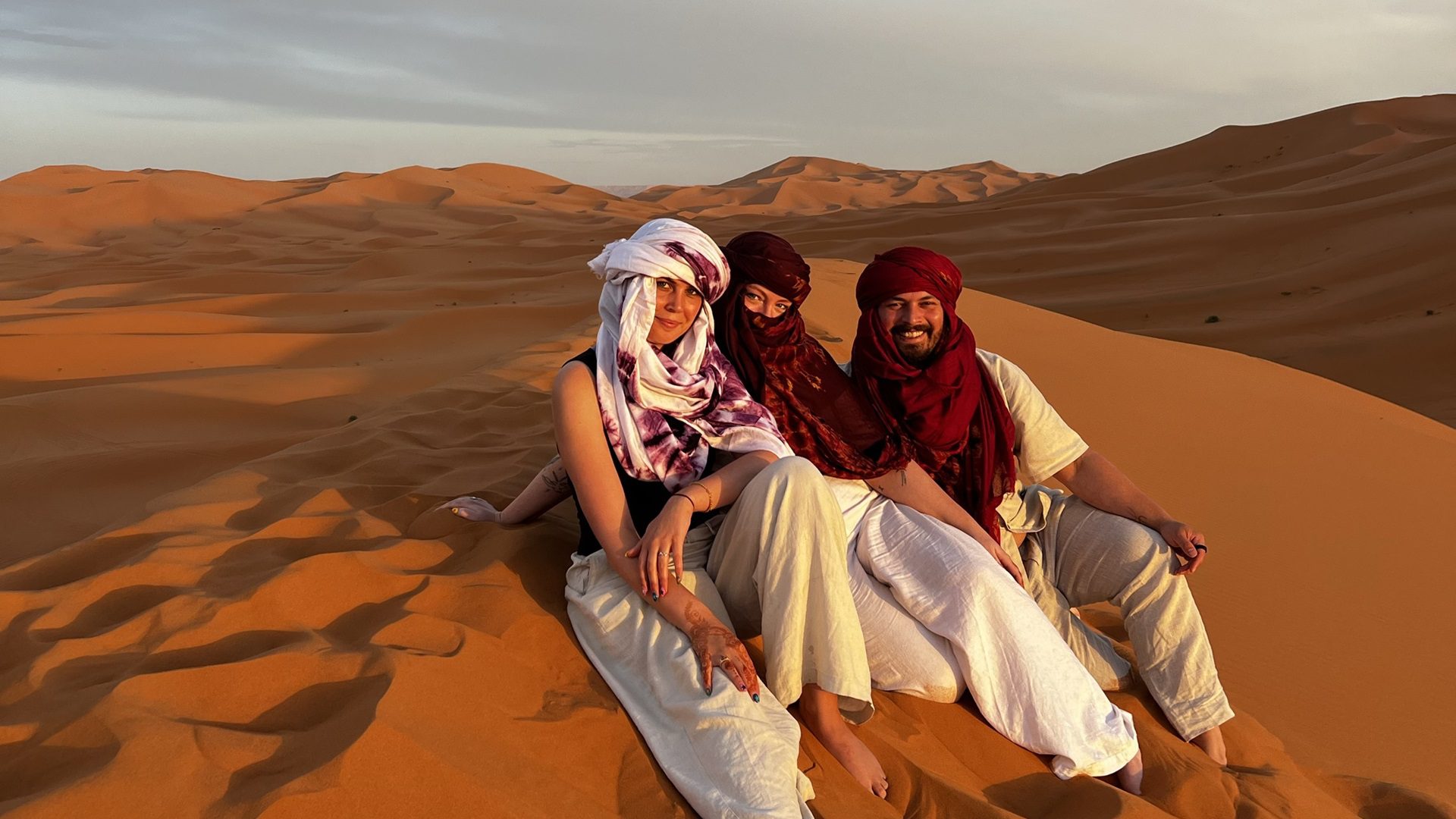
Watching the sunset over the Sahara
As the camels led us into the warm glow of the Sahara, everybody was feeling a sense of delight. This highly anticipated moment hadn’t been overhyped after all. As the sun began to set, we felt like we had this huge expanse of desert all to ourselves.
When you’re somewhere as epic as the Sahara, it’s easy to spend every moment trying to snap the best golden hour photos and quoting lines from the movie Dune at the top of your lungs through fits of giggles. Luckily, our leader, El Houssine, was well versed in how quickly the sands of time can pass by.
‘Okay, now it’s important for all of you to find your own spot at the top of the dune. Yes, alone! Trust me. Take a moment for yourself, breathe it in, watch the sun go down and just be quiet,’ he said. ‘ This is a once-in-a-lifetime experience!’
Was this all a ruse to shut us up? Possibly. But, taking his words as gospel, we scattered – and suddenly, I was alone. Alone to reflect on why I was here, in the middle of an ancient desert, on a continent I’d never visited. Just as John trailed the dunes in the distance, a fresh paper crane in his hand thanks to Taia, I was completing my own grief ritual.
Using travel to ease the pain of grief
A year and a half earlier, just before my 30th birthday, my dad had also left this Earthly plane. The loss was unexpected, heart wrenching and the hardest thing I’ve ever gone through. A painter, photographer and free spirit, my dad was always my number one supporter, teaching me to see the beauty in Mother Nature – in the miracle of life. Now, when I travel, or whenever I feel his absence stronger than the day before, I make sure to watch the sunset or say a little ‘hey dad’ at the moon.
This I had not shared with the group – it still felt too fresh, too vulnerable. I was inspired to share after hearing John’s story, but it still felt like Kari’s moment. But Dan knew. Zoe knew. And they both held my hand as I whispered, ‘Dad would’ve loved this’ – walking through artists’ markets in Chefchaouen, the narrow streets and lively bazaars of Fes and now, sitting on top of a golden dune overlooking endless desert. Dad would’ve loved this. Kari would’ve loved this.
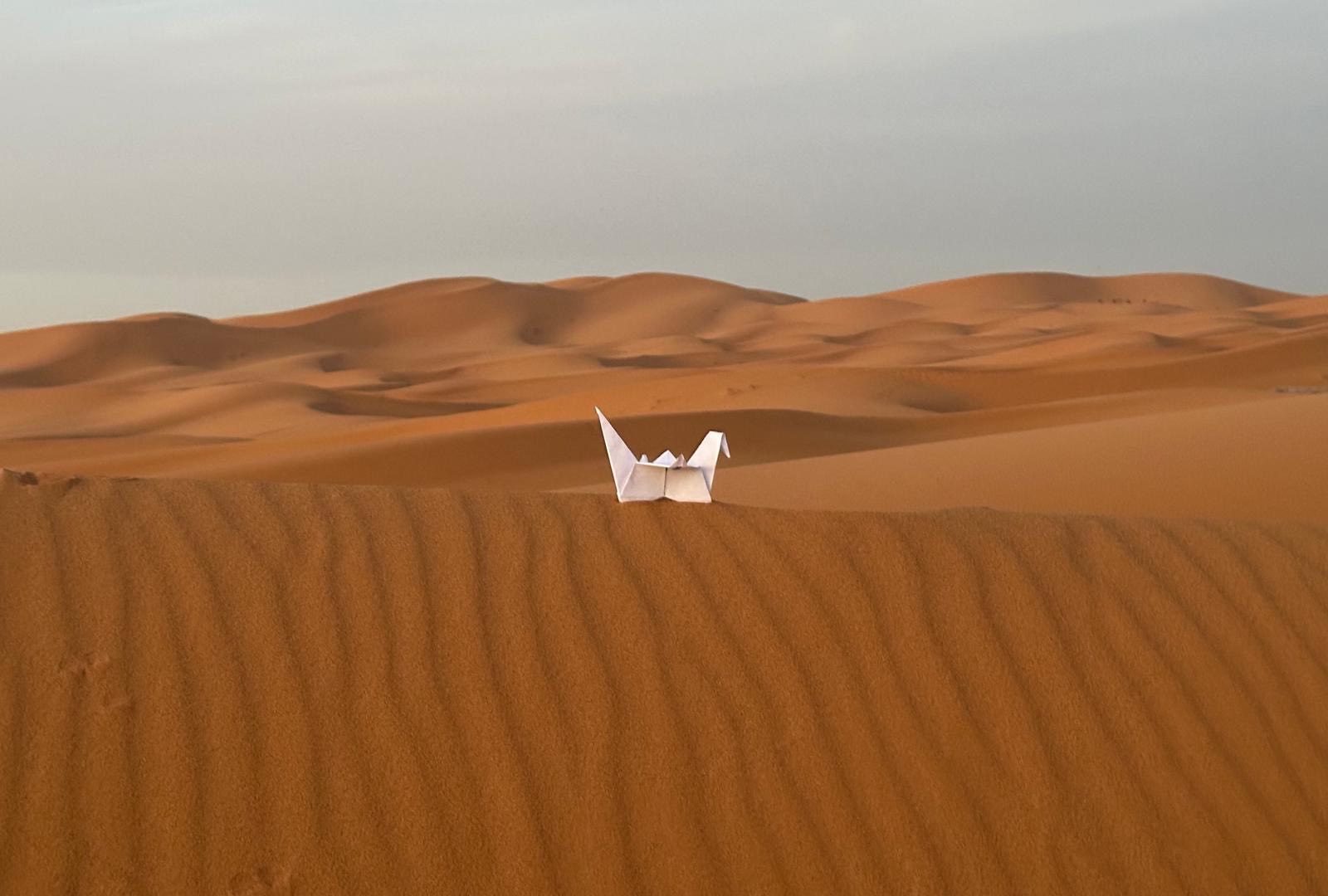
Loving where you are and feeling gratitude
It feels wrong to think that you’re living in place of those you’ve lost, but in a way, you are. You appreciate everything a little more, you see the world in a different light and your humanity, mortality and ability to love all become a little more visceral after loss.
Because El Houssine was right – the sands of time will slip through our fingers. And there’s nothing more important than catching all the little moments as they pass, to appreciate where you are, what you have and who’s around you.
Just like I had found a way to process my grief through my love of travel, others were doing the same. And only through travelling with strangers were we able to find each other, connect and share our stories, reminding us that we’re not so different. Loss is part of the human experience. Grief is just love with nowhere to go. So some of us choose to take it places.
So, I sat on the massive sandy dune with the grunting camels below and those I love the most on either side of me, and I said hello to my dad as the sun set over the Sahara. ‘You would’ve loved this, Dad – but I’m here now, to love it for you.’
A crane has now been left in Morocco, Canada, Alaska, Norfolk Island, the Cook Islands, New Zealand, Ecuador, Papua New Guinea, Peru, Fiji, Singapore, Indonesia, Thailand, Vietnam, Portugal, Scotland, the US, Zimbabwe, Mozambique, Bolivia, South Africa, Australia’s Outback and the Galapagos Islands – all in memory of Kari-Lee, the adventurous young woman who wanted nothing more than to see the world.
As John, Julianne, Rhyl, Cass, Kari’s nurse and countless others leave cranes all over the world, I’ll be watching the sunset for my dad, Kym, in as many places as time allows.
Chalice travelled on the 13-day Morocco Uncovered trip. Create your own moment of quiet reflection on any one of Intrepid’s Morocco adventures.

